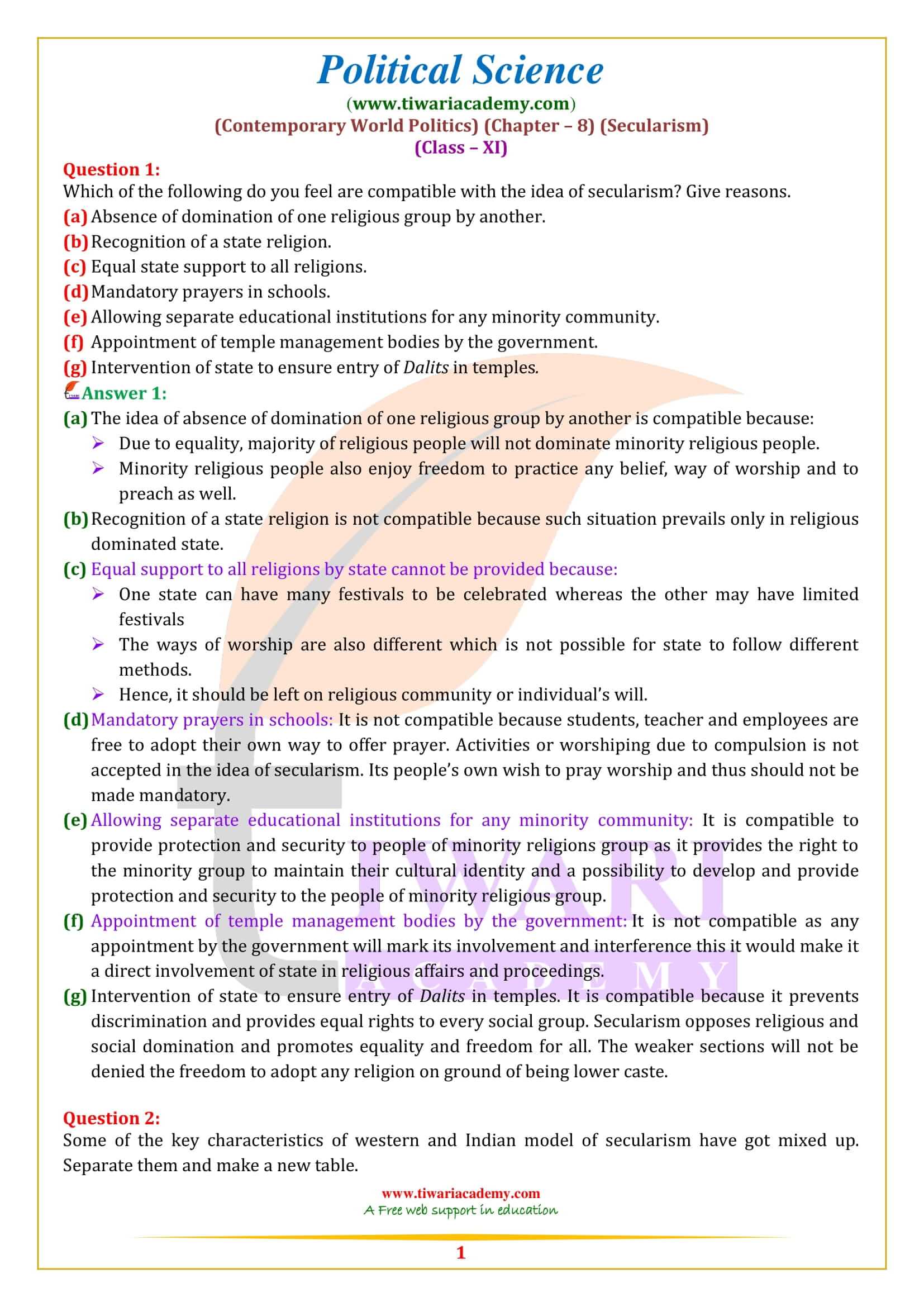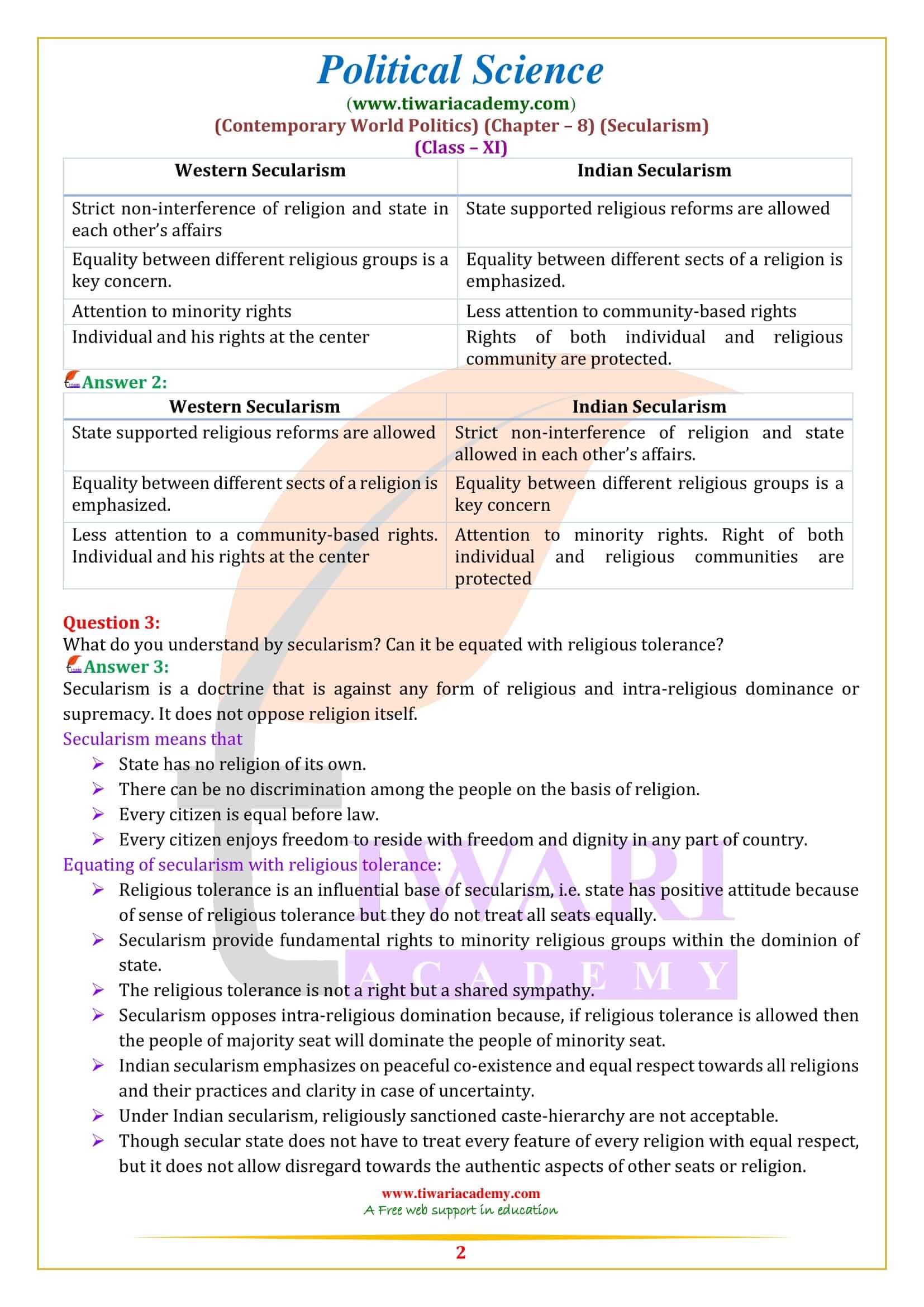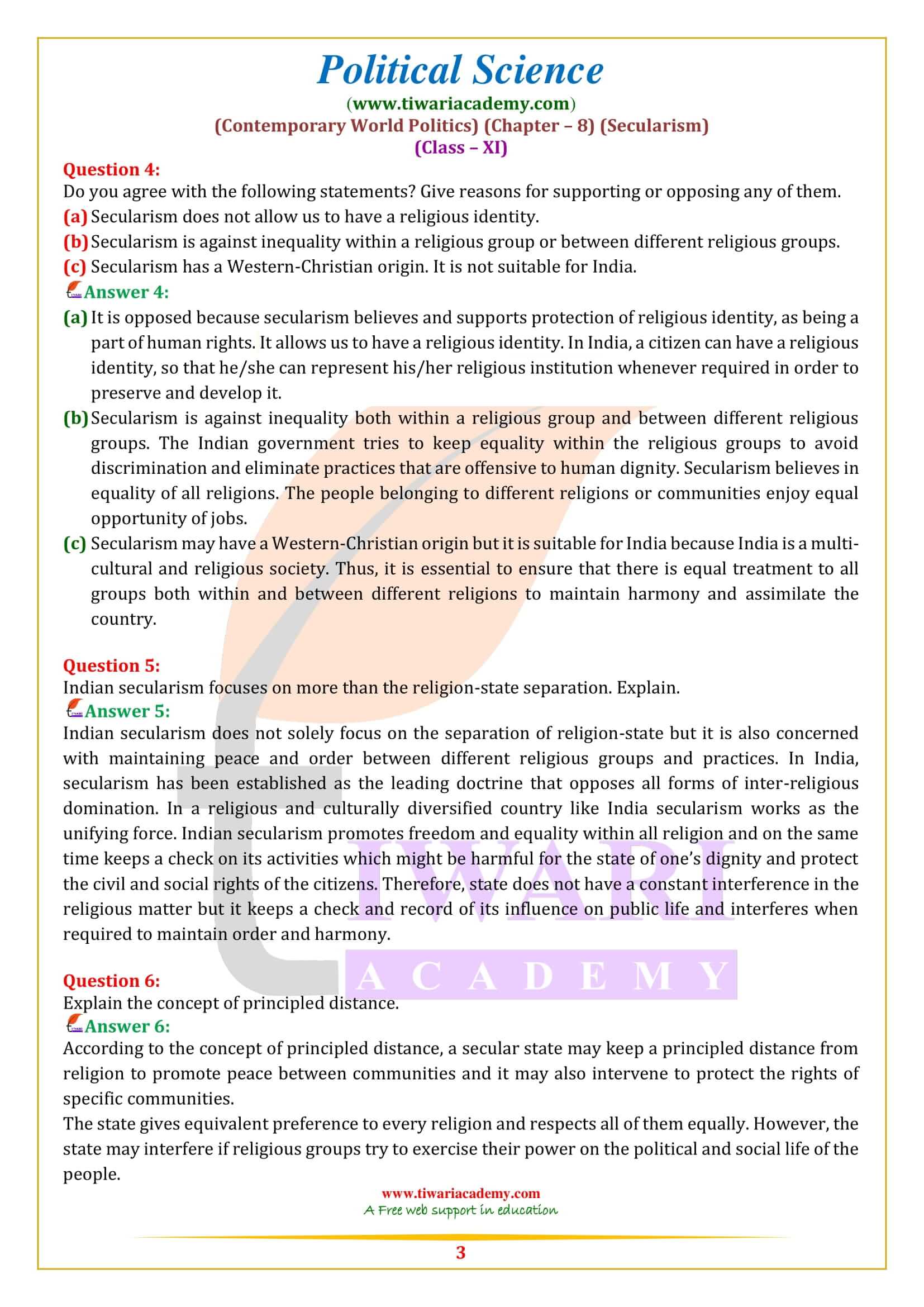NCERT Solutions for Class 11 Political Science Chapter 8 Secularism in English and Hindi Medium question answers updated for new academic session 2025-26. Class 11 Political Science chapter 8 extra questions taken from Political Theory book are given here in simplified format.
NCERT Solutions for Class 11 Political Science Chapter 8
Which of the following do you feel are compatible with the idea of secularism? Give reasons.
(a) Absence of domination of one religious group by another.
(b) Recognition of a state religion.
(c) Equal state support to all religions.
(d) Mandatory prayers in schools.
(e) Allowing separate educational institutions for any minority community.
(f) Appointment of temple management bodies by the government.
(g) Intervention of state to ensure entry of Dalits in temples.
Answer:
(a) The idea of absence of domination of one religious group by another is compatible because:
1. Due to equality, majority of religious people will not dominate minority religious people.
2. Minority religious people also enjoy freedom to practice any belief, way of worship and to preach as well.
(b) Recognition of a state religion is not compatible because such situation prevails only in religious dominated state.
(c) Equal support to all religions by state cannot be provided because:
1. One state can have many festivals to be celebrated whereas the other may have limited festivals
2. The ways of worship are also different which is not possible for state to follow different methods.
3. Hence, it should be left on religious community or individual’s will.
(d) Mandatory prayers in schools: It is not compatible because students, teacher and employees are free to adopt their own way to offer prayer. Activities or worshiping due to compulsion is not accepted in the idea of secularism. Its people’s own wish to pray worship and thus should not be made mandatory.
(e) Allowing separate educational institutions for any minority community: It is compatible to provide protection and security to people of minority religions group as it provides the right to the minority group to maintain their cultural identity and a possibility to develop and provide protection and security to the people of minority religious group.
(f) Appointment of temple management bodies by the government: It is not compatible as any appointment by the government will mark its involvement and interference this it would make it a direct involvement of state in religious affairs and proceedings.
(g) Intervention of state to ensure entry of Dalits in temples. It is compatible because it prevents discrimination and provides equal rights to every social group. Secularism opposes religious and social domination and promotes equality and freedom for all. The weaker sections will not be denied the freedom to adopt any religion on ground of being lower caste.
What do you understand by secularism? Can it be equated with religious tolerance?
Secularism is a doctrine that is against any form of religious and intra-religious dominance or supremacy. It does not oppose religion itself.
Secularism means that:
- State has no religion of its own.
- There can be no discrimination among the people on the basis of religion.
- Every citizen is equal before law.
- Every citizen enjoys freedom to reside with freedom and dignity in any part of country.
Equating of secularism with religious tolerance:
- Religious tolerance is an influential base of secularism, i.e. state has positive attitude because of sense of religious tolerance but they do not treat all seats equally.
- Secularism provide fundamental rights to minority religious groups within the dominion of state.
- The religious tolerance is not a right but a shared sympathy.
- Secularism opposes intra-religious domination because, if religious tolerance is allowed then the people of majority seat will dominate the people of minority seat.
- Indian secularism emphasizes on peaceful co-existence and equal respect towards all religions and their practices and clarity in case of uncertainty.
- Under Indian secularism, religiously sanctioned caste-hierarchy are not acceptable.
- Though secular state does not have to treat every feature of every religion with equal respect, but it does not allow disregard towards the authentic aspects of other seats or religion.
Indian secularism focuses on more than the religion-state separation. Explain.
Indian secularism does not solely focus on the separation of religion-state but it is also concerned with maintaining peace and order between different religious groups and practices. In India, secularism has been established as the leading doctrine that opposes all forms of inter-religious domination. In a religious and culturally diversified country like India secularism works as the unifying force.
Indian secularism promotes freedom and equality within all religion and on the same time keeps a check on its activities which might be harmful for the state of one’s dignity and protect the civil and social rights of the citizens. Therefore, state does not have a constant interference in the religious matter but it keeps a check and record of its influence on public life and interferes when required to maintain order and harmony.
Explain the concept of principled distance.
According to the concept of principled distance, a secular state may keep a principled distance from religion to promote peace between communities and it may also intervene to protect the rights of specific communities.
The state gives equivalent preference to every religion and respects all of them equally. However, the state may interfere if religious groups try to exercise their power on the political and social life of the people.
This balanced distance of state from religious groups is called principled distance.
- A secular state is committed to principles and goals that are derived from non-religions sources including peace, religious freedom, freedom from discrimination and inter-religious and intra-religious equality.
- Secular states are neither theocratic nor establish a religion.
- Separation of religion and state is a shared exclusion not to intervene in the affairs of religion and as well religion will not get in the way in the affairs of state.
- No policy of the state can have a solely religious basis because state and religion both exercise separate spheres of their own.
- The state cannot assist any religious institution or provide any monetary support to religious communities as well as it cannot hamper the activities of religious communities which are within the broad limits set by law of land.
- Religion is a personal matter and it is not a matter of state policy or law.





